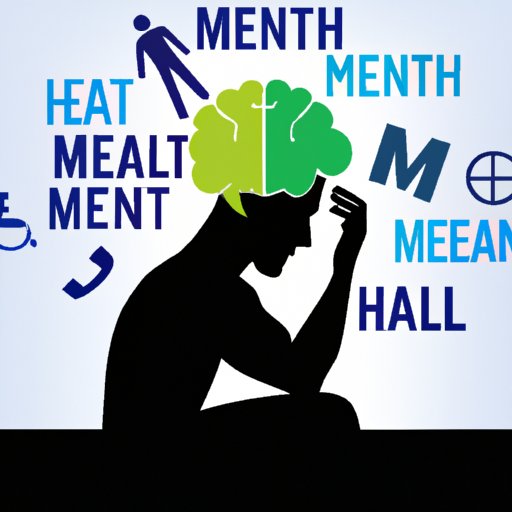Introduction
Mental health is an important issue for people of all ages, but it can be particularly challenging for young adults. Mental health refers to a person’s emotional, psychological, and social well-being, and it can affect how we think, feel, and act. Mental health conditions such as depression, anxiety, and bipolar disorder can have a significant impact on young adults, making it important to understand the prevalence, causes, and impacts of mental health issues among this population.
Examining the Prevalence of Mental Health Issues Among Young Adults
According to the National Alliance on Mental Illness, approximately 20% of adults aged 18-25 experience some form of mental illness. While mental health issues can affect anyone, young adults are particularly vulnerable due to the unique stressors they face, such as transitioning into adulthood and navigating new relationships. Mental health issues are also more common among certain age groups, with those aged 18-25 being the most likely to be affected.
Gender also plays a role in mental health, with women being more likely than men to experience depression and anxiety. Women are also more likely to seek help for mental health issues, while men are more likely to suffer in silence. This can lead to serious consequences if left untreated, so it is important that both men and women have access to resources and support.

Exploring the Causes of Mental Health Problems in Young Adults
There are many potential causes of mental health issues in young adults, including environmental factors such as stressors, trauma, and other risk factors. Stressors such as academic pressures, financial worries, and relationship difficulties can all contribute to mental health issues. Trauma can also play a role, with those who have experienced traumatic events in their lives being more likely to develop mental health problems.
Genetics can also be a factor, with some mental health conditions being linked to genetic predispositions. Social and cultural influences can also play a role, with certain cultural norms and expectations putting additional stress on young adults. It is important to note that mental health issues can arise from a combination of these factors, so understanding the underlying causes is essential for providing effective treatment.
Investigating the Impact of Mental Health on Academic Performance
Mental health issues can have a significant impact on academic performance, with studies showing that students with mental health issues tend to have lower grades and higher dropout rates. Mental health issues can affect learning and memory, making it difficult to absorb and retain information. They can also impair attention and concentration, making it hard to focus on tasks for extended periods of time. Additionally, mental health issues can lead to poor time management and organization, which can further hinder academic performance.

Analyzing the Relationship Between Social Media and Mental Health
Social media has become an integral part of modern life, and it can have both positive and negative effects on mental health. On the one hand, social media can provide an outlet for self-expression and connection with others. On the other hand, it can lead to feelings of envy, isolation, and low self-esteem. Additionally, social media can be addictive, leading to excessive use that can worsen mental health issues.
Cyberbullying can also be a problem, with young adults being particularly vulnerable to its effects. Cyberbullying can lead to feelings of shame, guilt, and depression, and it can worsen existing mental health issues. It is important for young adults to be aware of the risks of online bullying and to know where to turn for support if they are targeted.
Assessing the Long-Term Impact of Mental Health Conditions on Young Adults
Mental health issues can have long-term consequences if left untreated, with physical health complications such as headaches, chronic pain, and sleep disturbances being common. Mental health issues can also make it difficult to maintain a job or pursue higher education, resulting in financial struggles. Additionally, mental health issues can lead to loneliness and isolation, making it harder to build and maintain meaningful relationships.

Discussing Strategies to Improve Mental Health Support for Young Adults
It is important for young adults to have access to resources and support for mental health issues. Seeking professional help is an important first step, as mental health professionals can provide diagnosis and treatment options. Developing coping skills such as mindfulness, relaxation techniques, and cognitive behavioral therapy can also be beneficial. Additionally, building strong support networks with family and friends can provide a sense of connection and reduce feelings of loneliness and isolation.
Conclusion
Mental health issues can have a significant impact on young adults, and it is important to understand the prevalence, causes, and impacts of these issues. Stressors, trauma, genetics, and social and cultural influences can all contribute to mental health issues, and they can impair academic performance and lead to long-term physical and financial consequences. Fortunately, there are strategies that can help improve mental health support for young adults, such as seeking professional help, developing coping skills, and building strong support networks.
(Note: Is this article not meeting your expectations? Do you have knowledge or insights to share? Unlock new opportunities and expand your reach by joining our authors team. Click Registration to join us and share your expertise with our readers.)
